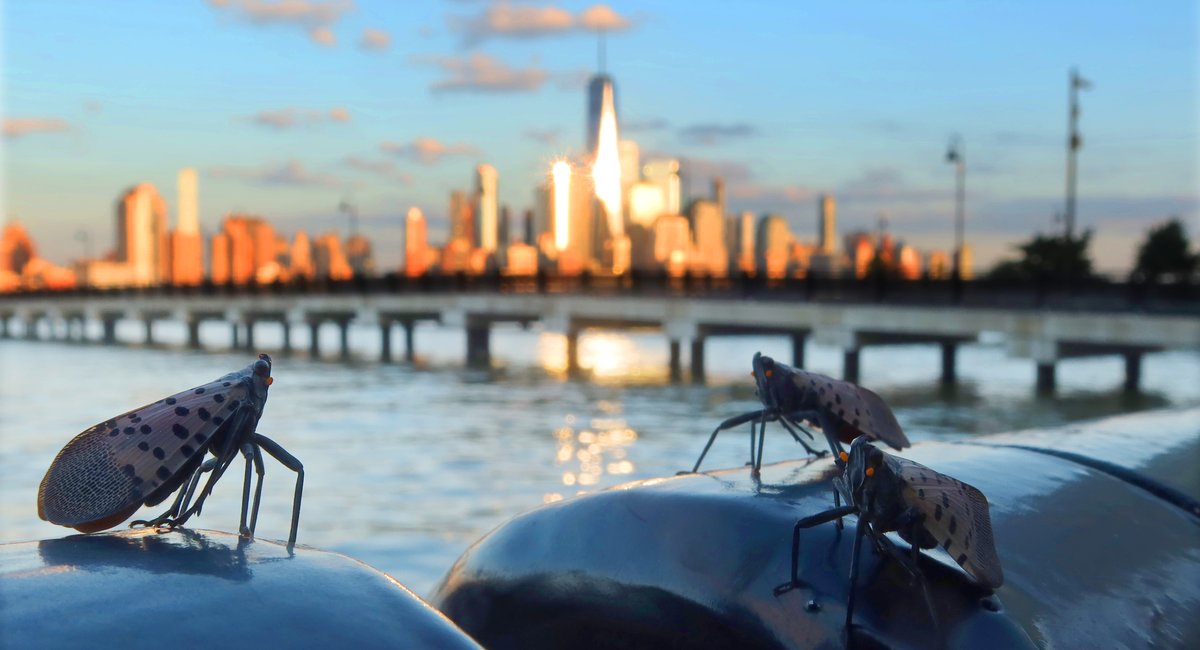Invasive spotted lanternflies are harming plant life across New York by sucking sap from trees and vines at an alarming rate. But scientists say the insects’ poop, known as “honeydew,” is also a major cause for concern.
The caramel-colored waste is a sugary goo that bees collect to make honey, and can be destructive when it lands on plants or human property.
On sunny summer days across the region, trees infested by the invasive insects are surrounded by the constant drip of their poop as it pours down like a sticky, viscous rain. Because lanternflies are constantly feeding, they’re constantly defecating. The pests’ sweet excrement gets all over plants, forming a black mold that inhibits photosynthesis. That can slow plant growth and reduce crop yields, and may even kill a plant if it’s completely covered.
“If there’s a high population [of spotted lanternflies], you really don’t want to walk under that tree without a hat and maybe a raincoat or an umbrella,” said Kelli Hoover, an entomology professor at Penn State University.
And although spotted lanternfly poop isn’t harmful to human health, it can still cause a lot of damage. The New York State Department of Agriculture and Markets estimated that if the polka-dotted bugs aren’t kept in check, they could cost the Empire State at least $300 million annually in damaged property.
When one of the insects relieves itself, the brownish spray can collect on vehicles, homes, patios and anything left outdoors. When the excrement lands on property, it can dry and harden and be very difficult to remove. Experts say the resulting sooty mold can ruin car paint and upholstery.
State environmental officials are making a big push to control spotted lanternfly populations, with pesticides by asking New Yorkers to stomp them on sight. Federal researchers are even mulling whether to introduce a predator from the lanternfly’s native habitat.
“It can reduce the quality of life if you have a lot of the honeydew that’s dripping down onto your picnic table or your cars,” said Brian Eshenaur, invasive species specialist at Cornell University’s integrated pest management program.
Within a few days of a spotted lanternfly infestation, mold begins to grow on the newly sticky surfaces of leaves, vehicles and anything else that is within spraying distance of an infested tree. After a couple of weeks, the dark, ashy stain from the fungus becomes ubiquitous.
The lanternflies are attracted to more than 100 plant species, but prefer the tree of heaven, which is also invasive and comes from the insects’ native habitat. The black mold created by the poop doesn’t affect tree trunks, but the sugary residue attracts an army of pests such as mosquitoes, wasps and hornets, which can build hives on residential properties.
“We know there are spotted lanternfly in a tree even if we can’t see the insect. We can see the sooty mold because it will grow on the trunk as well, where they drop it,” Hoover said. “If you go to places where [the] lanternfly has been for nine or 10 years, almost all the tree of heaven [varieties] you see have a black trunk.”
The sweet poop is not all bad. In the fall, many bees gather it up and process it as honey. In Pennsylvania, lanternfly honey is sold for human consumption for about $12 per pound. The flavor is described as earthy, smoky and woodsy, with a hint of burnt caramel.
“I think it smells terrible like dirty socks, but there are people who like it,” Hoover said. “I’ve tasted it, and there’s a bitterness to it that comes from the bitter-tasting chemicals in the tree of heaven sap.”
Philadelphia Bee Company says the honey has a smoky lingering aftertaste that is not as sweet as common honey. Pocono Apiaries, which sells lanternfly honey, recommends pairing it with pizza, wings, cornbread and barbecue.
According to Penn State University researchers, the lanternfly honey also has medicinal properties. In traditional Chinese medicine, the excrement is considered poisonous, but it’s used to treat cancers and as a topical relief for inflammation.
The sugary poo also prevents the growth of antibiotic-resistant bacteria such as E. coli and staph.
